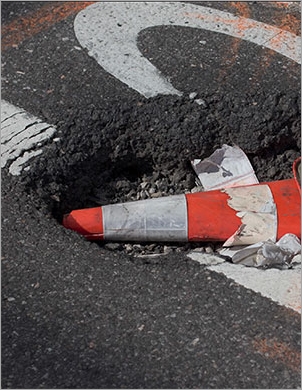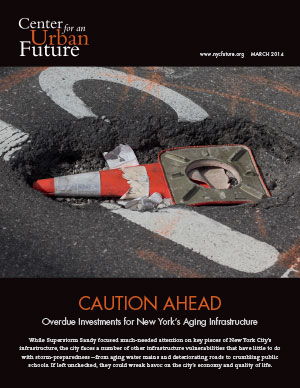Our March 2014 Caution Ahead report brought significant attention to New York City’s aging underground infrastructure, detailing numerous vulnerabilities across city’s the water, sewer and gas pipes. The report documented that while the city’s water mains are 69 years old, on average, water main replacement had declined significantly in recent years, from 58 miles of annual replacement from 2002- 2007 to 27 miles of annual replacement over the last six years. Over this period, New York experienced over 400 annual water main breaks on all but one occasion. Sewer replacement has also declined, from 42 miles of annual installation from 2000- 2006 to 17 miles annually over the last seven years. Among the city’s private natural gas providers, Con Edison and National Grid, the report found that over 50 percent of the city’s gas mains are composed of unprotected steel or cast iron, two leak prone materials. In response to the report’s findings, utility companies and city agencies have begun accelerating their underground infrastructure investments.
Among the report’s recommendations, we urged the city’s natural gas providers to expedite their replacement schedule of leak prone unprotected steel and cast iron pipes. This June, National Grid responded by announcing that they would do just that, nearly doubling their investment in the coming years and pledging to replace 70 miles per year. Previously on pace to remove all unprotected steel and cast iron pipes by 2060, National Grid now intends to complete the work by 2045.
At the city level, the report sparked the creation of Mayor de Blasio’s Underground Infrastructure Working Group and prompted the City Council to convene a hearing focused on the city’s aging underground infrastructure. The Mayor’s Underground Infrastructure Working Group is tasked with accelerating the replacement of both public and private underground utilities and improving safety. The Group’s inaugural report endorsed several of Caution Ahead’s recommendations including Joint Bidding legislation to better coordinate the work of contractors and utility companies, more coordinated information sharing and capital planning between the city’s Department of Transportation and the utility companies and increased investment in replacing the city’s cast-iron water mains and brick sewers. Specifically, the Department of Environmental Protection just committed to replacing 80 miles of water mains per year, a significant increase from recent years and a benchmark the Center for an Urban Future argued for in our report.



